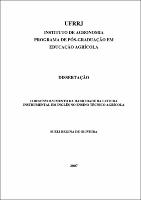Please use this identifier to cite or link to this item:
https://rima.ufrrj.br/jspui/handle/20.500.14407/12368| Tipo do documento: | Dissertação |
| Title: | O desenvolvimento da habilidade da leitura instrumental em inglês no ensino técnico agrícola |
| Other Titles: | The development of the ability of the instrumental reading in English in the agricultural technical education |
| Authors: | Oliveira, Sueli Regina de |
| Orientador(a): | Frade, Celina de Castro |
| Keywords: | Educação Agrícola;inglês instrumental;leitura;agricultural education;instrumental english;reading |
| Área(s) do CNPq: | Educação |
| Idioma: | por |
| Issue Date: | 14-Dec-2007 |
| Publisher: | Universidade Federal Rural do Rio de Janeiro |
| Sigla da instituição: | UFRRJ |
| Departamento: | Instituto de Agronomia |
| Programa: | Programa de Pós-Graduação em Educação Agrícola |
| Citation: | OLIVEIRA, Sueli Regina de. O desenvolvimento da habilidade da leitura instrumental em inglês no ensino técnico agrícola. 2007. 117 f. Dissertação (Mestrado em Educação Agrícola) - Instituto de Agronomia, Universidade Federal Rural do Rio de Janeiro, Seropédica - RJ, 2007. |
| Abstract: | Em geral, a disciplina língua inglesa na escolarização formal brasileira tem sido considerada apenas uma a mais no currículo e não um elemento importante na formação do aluno, como um direito que lhe deve ser assegurado. Com freqüência, esta disciplina não ocupa um lugar privilegiado no currículo, sendo ministrada, em algumas regiões, em apenas uma ou duas séries do ensino fundamental. A língua inglesa possui, portanto, um status de simples atividade curricular, sem caráter de promoção ou reprovação, não inserida no processo mais amplo de formação educacional do aluno. No ensino profissionalizante, o ensino de língua inglesa deve ser voltado para os objetivos específicos do aluno de chegar mais rapidamente às fontes de informação de seu interesse, ampliando assim suas perspectivas para o mercado de trabalho e conseqüente ascensão profissional. A pesquisa teve como intuito investigar o desenvolvimento da habilidade de leitura instrumental em inglês em alunos do ensino agrícola, mais particular em alunos do Curso Técnico em Agropecuária do Colégio Agrícola Senador Carlos Gomes de Oliveira (CASCGO), município de Araquari, SC. Para tal, pretendeu-se verificar, por meio da leitura de textos técnicos e tarefas relacionadas, quais fatores lingüísticos e extra-lingüísticos contribuíram (ou não) para este desenvolvimento. Optou-se pelo estudo de caso pelo fato da pesquisa ser aplicada em um número fixo de informantes dentro de um contexto específico de aprendizagem. A pesquisa é de natureza qualitativa, tanto na coleta de dados quanto na análise e discussão dos dados, organizada em forma de texto. Entretanto, para maior facilidade de visualização dos resultados obtidos, foram usados gráficos e tabelas com dados quantitativos. |
| Abstract: | In general, the discipline 'English language' in the Brazilian formal education it has just been considered one more in the curriculum and no an important element in the student's formation, as a right that should be insured to the students. Frequently, this discipline doesn't occupy a privileged place in the curriculum, being supplied, in some areas, in just one or two series of the fundamental teaching. The English language possesses, therefore, a status of simple activity curricular, without promotion character or disapproval, no inserted in the widest process of the student's education formation. In the vocational teaching, the teaching of English language should be come back for the student's specific objectives from arriving more quickly to the information sources of his interest, enlarging their perspectives for the job market and consequent professional ascension. The research has as intention to investigate the development of the ability of instrumental reading in English in students of the agricultural teaching, more matter in students of the Technical Course in Farming of ´Colégio Agrícola Senador Carlos Gomes de Oliveira´ (CASCGO), municipal district of Araquari, SC. For such, it intends to verify, through the reading of technical texts and related tasks, which linguistic and extra-linguistic factors contributed (or no) for this development. The researcher had opted for the case study for the fact of the research to be applied in a fixed number of informers inside of a specific context of learning. The research is of qualitative nature, in the data collection and in the analysis and discussion of the data, organized in text form. However, for larger easiness of visualization of the obtained results, graphs and tables were used with quantitative data. |
| URI: | https://rima.ufrrj.br/jspui/handle/20.500.14407/12368 |
| Appears in Collections: | Mestrado em Educação Agrícola |
Se for cadastrado no RIMA, poderá receber informações por email.
Se ainda não tem uma conta, cadastre-se aqui!
Files in This Item:
| File | Description | Size | Format | |
|---|---|---|---|---|
| 2007 - Sueli Regina de Oliveira.pdf | Documento principal | 6.4 MB | Adobe PDF |  View/Open |
Items in DSpace are protected by copyright, with all rights reserved, unless otherwise indicated.

